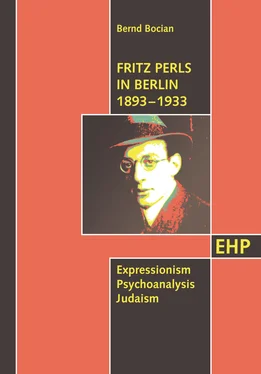Bernd Bocian - Fritz Perls in Berlin 1893 - 1933
Здесь есть возможность читать онлайн «Bernd Bocian - Fritz Perls in Berlin 1893 - 1933» — ознакомительный отрывок электронной книги совершенно бесплатно, а после прочтения отрывка купить полную версию. В некоторых случаях можно слушать аудио, скачать через торрент в формате fb2 и присутствует краткое содержание. Жанр: unrecognised, на английском языке. Описание произведения, (предисловие) а так же отзывы посетителей доступны на портале библиотеки ЛибКат.
- Название:Fritz Perls in Berlin 1893 - 1933
- Автор:
- Жанр:
- Год:неизвестен
- ISBN:нет данных
- Рейтинг книги:3 / 5. Голосов: 1
-
Избранное:Добавить в избранное
- Отзывы:
-
Ваша оценка:
- 60
- 1
- 2
- 3
- 4
- 5
Fritz Perls in Berlin 1893 - 1933: краткое содержание, описание и аннотация
Предлагаем к чтению аннотацию, описание, краткое содержание или предисловие (зависит от того, что написал сам автор книги «Fritz Perls in Berlin 1893 - 1933»). Если вы не нашли необходимую информацию о книге — напишите в комментариях, мы постараемся отыскать её.
Fritz Perls in Berlin 1893 - 1933 — читать онлайн ознакомительный отрывок
Ниже представлен текст книги, разбитый по страницам. Система сохранения места последней прочитанной страницы, позволяет с удобством читать онлайн бесплатно книгу «Fritz Perls in Berlin 1893 - 1933», без необходимости каждый раз заново искать на чём Вы остановились. Поставьте закладку, и сможете в любой момент перейти на страницу, на которой закончили чтение.
Интервал:
Закладка:
In addition to Perls’s many years of therapeutic experience with serious emotional disturbances, his »strong stubborn intellect« (Perls 1977, 248) combined here with his great intuition and a willingness »to risk his life and reputation« (ibid., 98 ) in the truest sense of the word in therapeutic situations. With the authority of a theater dramaturgist, Perls arrogated the right to determine what was genuine and false in the »scene« presented. There are any number of testimonials concerning the gentleness and sensitivity of his approach as well as his tough, confrontational manner which opened new perspectives for some clients and deeply injured others (see Gaines 1979; Clarkson et al. 1995; Cohn et al. 1991, 299 f.). The popularity of his late demonstrations led to increasing numbers of therapists viewing these techniques as the essence of Gestalt therapy and shifting their emphasis one-sidedly to triggering emotional outbursts quickly; Perls himself was disquieted by this. For him, Gestalt therapy was a growth path that takes its time and, above all, does not shy away from working through sorrow or sidestepping pain. This explains why he repeatedly mentioned the importance of Freud’s »magnificent work on grief« 38and his concept of »the work of mourning« (see Perls 1977, 277). Accordingly, he took a stand against confusing Gestalt therapy with a technique and against the »pseudo-spontaneity of the turner-onners« (Perls 1969a, 3).
It appears to me that the following remarks by Max Reinhardt reverberated in Perls who passed them on along with all of their positive and negative implications:
The comedian’s greatest power is truth, the ultimate, innermost, burning truth. Courageously show those who are wearing make-up what their faces look like without it, and leave (…) the false poses to them, the conventional lies, the artificial pathos, and the mass-produced, ready-made emotions. Don’t buy anything, don’t borrow anything, produce everything yourself. (…) Become substantial. It is not the world of appearances that you are entering today, it is the world of reality. The person who can hold his ground over the long run is not the one who does something, but only the one who is something. (Reinhardt 1993, 33)
Ongoing, daily therapeutic work has long since developed away from such riskladen intensity and moved in the direction of clinically sound, less spectacular channels with all of their advantages and disadvantages. But in my opinion that does not negate the fact that this message can still be found at the core of the Gestalt approach and continues to account for some of its attractiveness.
3.7 Sexuality. Freud and Kohut
3.7.1 Sexual Need and the Hunger for Life
During the period that Perls was at Reinhardt’s theater and attending the Askanisches Gymnasium, a new generation of artists formed in Germany. The word »Expressionism,« which had been borrowed from French and been in use from about 1910 on, developed into a concept that was applied to all German artistic modernism in the fields of painting, theater, and literature. The bearers of the new energy often came from the provinces, where they had broken out so to speak, and now gathered in Berlin. Korte identified one of the key motives for breaking out: »Experiencing the cold, rigid-authoritarian social order that emanated from the patriarchal family and was reflected in the petty bourgeois craving for status during the Wilhelminian Age, promoted a general sense of stagnation, listlessness, ennui, and torpor« (Korte 1994, 11).
Young people were united by a desire, now termed »Expressionist,« to destroy and unmask bourgeois values, a craving for new experiences, »a need for vitality, a new dawn, activity, for a life beyond the materialism and stolid rationalism of the bourgeoisie, a desire to surmount stagnation and compulsion« (ibid., 12). For the year 1911, Perls noted: »Finding my world. Fall in love. Poetry, philosophy, and mostly the theater« (Perls 1993, 5).
In the early years of Expressionism, Nietzsche played an important role for the young innovators. I assume that Perls came into contact with Nietzsche’s writings during his final years in secondary school, although Nietzsche was not on the curriculum. I imagine that Perls, too, was driven by the hunger for life that was typical of the young urban generation and is reflected in the poem George Grosz entitled »Song«:
We contain all the passions
and all the vices
and all the suns and stars,
chasms and heights,
trees, animals, forests, streams.
This is what we are.
Our experience lies
in our veins,
in our nerves.
We stagger.
Burning
between grey blocks of houses.
On bridges of steel.
Light from a thousand tubes flows around us, and a thousand violet nights etch sharp wrinkles in our faces. 39
Perls was confused by the façade of decency, the bourgeois male double standard he now observed in his father and other men in his family. An artist like Grosz expressed his rebellion against such burgher morality in drawings that combined sexuality and the desire to kill. Brecht, who was already leading an excessive, chauvinistic sex life during his secondary school years, expressed it in his early plays which provide an unvarnished look at his egoistic and immoral »Baalian« will to live. Referring to Grosz, Schneede points out: »During this period, Grosz countered the collective constraints of the Prussian-Wilhelminian age by escaping into abnormality, which in that society included crime and permissive sexuality alike. In this respect, the drawings are a signal for the decline of Wilhelminian influence on morality as well as an indication of personal liberation from imposed constraints« (Schneede 1989, 19).
Fritz Perls recalled that in his family sexuality and desire had nothing to do with procreation but had »turned into a matter of forbidden fun, sickness, and manipulation« (Perls 1977, 247). In his younger years, Perls was plagued by a fear that was actually typical of Catholic sex education during this period, namely, that too much masturbation ultimately led to death (see Perls 1977, 201). At a certain point, probably while he was performing so poorly at Mommsen Gymnasium, he believed that he had destroyed his memory through masturbation (ibid., p. 141). In a state of anxiety such as that, Sigmund Freud appeared to be a »ready-made saviour« (ibid.), because Freud’s theory revolved around both sex and remembering (ibid.).
At age 13, his friend Ferdinand Knopf provided him with an »initiation to fucking« (ibid., 252). This initial experience with a woman, a paid prostitute, proved traumatic and humiliating. The prostitute apparently became impatient because Perls was not reaching an orgasm and pushed him away. As Perls turned around, he saw that his friend had been watching the entire time, and felt cheated (ibid.). Perhaps this was one of the sources of his shamelessness: »I know that I am in this respect like Wilhelm Reich, brazen, suppressing much embarrassment« (ibid., 206).
Perls was confused during his adolescent years and didn’t know when he himself and his sexual needs were good or bad. He consulted a psychiatrist about his sexual distress, but the psychiatrist only prescribed pills. Perls had recognized that behind the »facade of respectability« (ibid., 202) his father did »quite a bit of leching« (ibid.), and his venerable Uncle Straub, a renowned legal scholar, was commit »the crime of seducing a minor« (ibid.). He himself felt his own »greed« (ibid., 201) and read Freud, who was »apparently saying yes to sex« (ibid., 202). Thus, Freud was the first person who permitted Perls to view sexuality from a perspective of non-moral acceptance. Herein lies one of the reasons for his lifelong admiration for the founder of psychoanalysis. In a fictitious conversation with him, Perls remarked, »I sure admire the tenacity you displayed to salvage sex from its sinful status in Western culture« (ibid., 93). Like many members of the cultural avant-garde during the experimentationprone, libertine years of the Weimar Republic, Perls used the space that formed within such circles to take sexual liberties; he tried rotating relationships and sexual threesomes and foursomes (see Perls 1977, 205 f.). For his entire life, he engaged in the form of free and uncommitted sexual relationships that had arisen during these years. At the height of his popularity, at the end of the 1960s on the American West Coast and within the context of the cultural revolutionary movement, his behavior once again fitted the Zeitgeist. Shepard referred to the aged Perls in his final years as »patriarchal, yes. But very sexy« (Shepard 1975, xv).
Читать дальшеИнтервал:
Закладка:
Похожие книги на «Fritz Perls in Berlin 1893 - 1933»
Представляем Вашему вниманию похожие книги на «Fritz Perls in Berlin 1893 - 1933» списком для выбора. Мы отобрали схожую по названию и смыслу литературу в надежде предоставить читателям больше вариантов отыскать новые, интересные, ещё непрочитанные произведения.
Обсуждение, отзывы о книге «Fritz Perls in Berlin 1893 - 1933» и просто собственные мнения читателей. Оставьте ваши комментарии, напишите, что Вы думаете о произведении, его смысле или главных героях. Укажите что конкретно понравилось, а что нет, и почему Вы так считаете.











